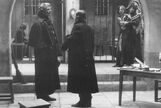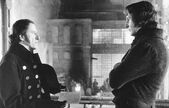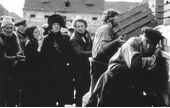The plot of this movie is simpler, focusing on the conflict between Jean Valjean and Sheriff Javert. Jean Valjean has changed from a criminal to a good man in the world. Not only has his soul been saved, he has also influenced others, and this kind of influence is unexpected. "Killing" Javert to his death. It turns out that this is a typical case of coaxing a person to death.
Javert's life philosophy is to punish evil and promote good, but Jean Valjean's method is to influence. The experiences of these two people are different, and the philosophy of life is naturally very different. Javert’s approach is like Western medicine in the treatment of diseases. Its core idea is to remove the bad cells so that the remaining good parts can grow healthily in order to achieve the healthy growth of the whole body; while Jean Valjean’s approach is more like the treatment of diseases in Chinese medicine. The cells gradually regulate until they return to a healthy state, so as to restore the entire body to normal. Traditional Chinese medicine, Western medicine, law and ethics, I even connected these after watching "Les Miserables" for the second time. Are there some similarities? One is the treatment of the human body, and the other is the social management.
Javert in the play is more like an upright legal machine that strictly maintains social order. Either black or white is his creed. He has always believed in order and jurisprudence. The release of Jean Valjean is a reward for gratitude, but it is also a blasphemy of his own beliefs. For such a person who enforced the law, letting off the criminals was a negligence. The balance of his conscience and dereliction of duty could not be settled. In the end, he chose to commit suicide.
People who have too little knowledge will eventually walk into the dead end of their beliefs. As everyone knows, their human nature is rich and colorful, and the world is even more exciting. People with more knowledge and experience are more tolerant and less likely to go to extremes. The historical background in the play is the French Revolution. The revolution is more radical. Can the image represented by Javert in the film allude to the radicals in the Revolution, wanting to deny the old system, overthrow everything, and overthrow it again, but this approach does not work. Solve all problems.
================================= The content of the masterpiece is so rich that it will be different every time you read it Feel. This time, I thought of the expression technique of literary works again. For a long time, there have been references and allusions to the expression of literature. For example, the work "A Dream of Red Mansions" in our country at almost the same time is a masterpiece that alludes to the history of the rise and fall of dynasties based on the history of the rise and fall of the family. The English name of "Les Miserables" is called The Wretched. It expresses the tragic state of French society at that time by describing the tragic fate of the characters. It describes the characters and also reveals the misery of the society in that historical period. It wants to make society more through revolution. It's beautiful, but it didn't fully achieve the purpose it really wanted to achieve. This masterpiece should not only bring you the ups and downs of the storyline and the thinking about human nature, it should also evoke human thinking about how to make society better at the least cost. The creation of each work is the embodiment of the author’s thoughts. Let’s take a look at Hugo’s own growth and experience and Hugo’s age and background when he created this work. You can better understand this work after reading these: In 1802, Hugo was born into a family of military officers. In 1830 (28 years old), the French "July Revolution", Hugo enthusiastically praised the revolution; 1831 (29 years old) "Notre Dame de Paris" published, his democratic thoughts enlightenment work; 1843 Years (41 years old) failed during the performance of the play "Guardian"; 1845 (43 years old) became a member of the Noble House; 1848 (46 years old) Hugo supported Napoleon III (France moves towards republic); 1851 (49 years old) ) Napoleon III's coup, proclaiming the monarchy. Hugo opposed and was in exile for 19 years; 1862 (60 years old) Hugo's novel "Les Miserables" came out; ... On May 22, 1885, Victor Hugo died in Paris. Respected by posterity as the Shakespeare of France. It can be said that "Les Miserables" is a work that combines Hugo's life's observations and thoughts. Its content covers the Napoleonic Wars and the following ten years, and it is integrated into French history, revolution, and war. , Moral philosophy, law, justice, religious beliefs. Different people reading "Les Miserables" can read different "Les Miserables", just as one thousand people read "Hamlet" and there are a thousand Hamlets.
View more about Les Misérables reviews











